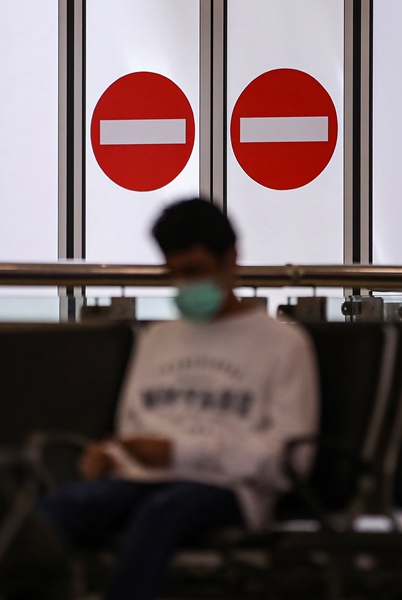
A passenger wearing a face mask sits at Sydney Airport in Sydney, Australia, March 16, 2020. [Photo/Xinhua]
The ongoing COVID-19 pandemic and its impact on society's higher education sector has brought to light the need for universities to review their risk management procedures concerning both the current and future pandemic(s). It is important to stress that while each pandemic must be managed in light of its specific features, critical general principles in dealing with a pandemic should cover multiple aspects.
Leadership. A pandemic is likely to impact almost every function and activity of a university. The executive and governing leadership of the university must have sufficient health, administrative, legal, financial, logistic, and other relevant expertise and experience to handle events, such as a pandemic.
Responsibilities and accountability. An effective response requires clear delineation of responsibilities and holding people accountable for results.
A member of the senior executive team should be responsible for coordinating the implementation of the university's Crisis Management Plan. They will lead a crisis response team with the appropriate medical or health expertise. This team will respond to external and internal stakeholders and coordinate their efforts with relevant government authorities.
Each university staff member will also have some responsibility to understand, support, and implement their role in relation to the Crisis Management Plan. For example, to avoid contagion, faculty need to work from home. They will require IT support and training that enables them to do this. Students will need resources and instructions on how to move their learning online. For example, they will need to know the details of assessment tasks, the expectations and outcomes for learning, the level of support provided, what learning resources are available and how they may be accessed, how examinations will be administered, and what happens in the case of lab and clinical work requirements. Travel restrictions and safety concerns are likely to result in a decline in applications and admissions and may require special arrangements with recruiting and assessment of qualifications.
Each student has the responsibility to report illnesses to the nominated officer, e.g., Dean of Students or a health professional. They should be required to read communications from the university and comply with instructions and guidelines to protect their safety and that of the wider university community.
Communication. Effective communication is vital. This includes regular and appropriate interactions with internal stakeholders (students, faculty, staff) as well as external stakeholders (parents, regulatory authorities, professional bodies, suppliers, etc.) This will include such matters as any classes that will continue with face-to-face delivery, changes to procedures and dates, information about suspending mid-semester tests and exams, visa issues, etc. This communication must be two-way, with mechanisms established for students to ask questions and voice concerns. It is also essential for everyone, including students and staff, to make sure contact details are up to date (with enrolled name, student number, etc.)
Preparedness. As part of good governance, the university's governing body must seriously assess disruptive events such as a pandemic, consider the possible and likely impacts, including disruptions to the educational model and viability. The institution should also review insurance and other risk management measures. No doubt, following the COVID-19 pandemic, new products, services, and technology will emerge to help organizations deal with future pandemics.
Collaboration. Universities must work collaboratively with a variety of internal and external resources to ensure all medical response processes are communicated and implemented to address the health and wellbeing of the university community while minimizing the impact on university operations.
Continuance of core service. Universities should focus on continuing the delivery of its core services to students and staff to ensure their wellbeing and safety, such as health advice, counseling, and other relevant assistance, such as pandemic information updates, emergency contacts, traveling, social distance requirements, and so on. Moreover, universities should provide special emergency supplies and equipment, for example, sanitizers, face masks, and other protective clothing or devices to protect students and staff.
Flexibility, adaptability and responsiveness. Pandemics involve highly dynamic situations that require the organization to be highly flexible and to adapt to changing conditions and respond appropriately, such as changes in operating hours, staff availability, rules governing social distancing, and so on. Universities could organize virtual events and develop a digital learning community that emulates the kinds of events and engagements that would typically occur in a face-to-face environment.
All of the adjustments discussed above will have an impact on finance and budget. Financial impacts must be closely monitored so that universities can ensure that adequate resources are available to do whatever is required for the best interests of our students, staff, and all of the university community.
Eugene Clark is a columnist with China.org.cn. For more information please visit:
http://www.china.org.cn/opinion/eugeneclark.htm
Opinion articles reflect the views of their authors only, not necessarily those of China.org.cn.
If you would like to contribute, please contact us at opinion@china.org.cn.




